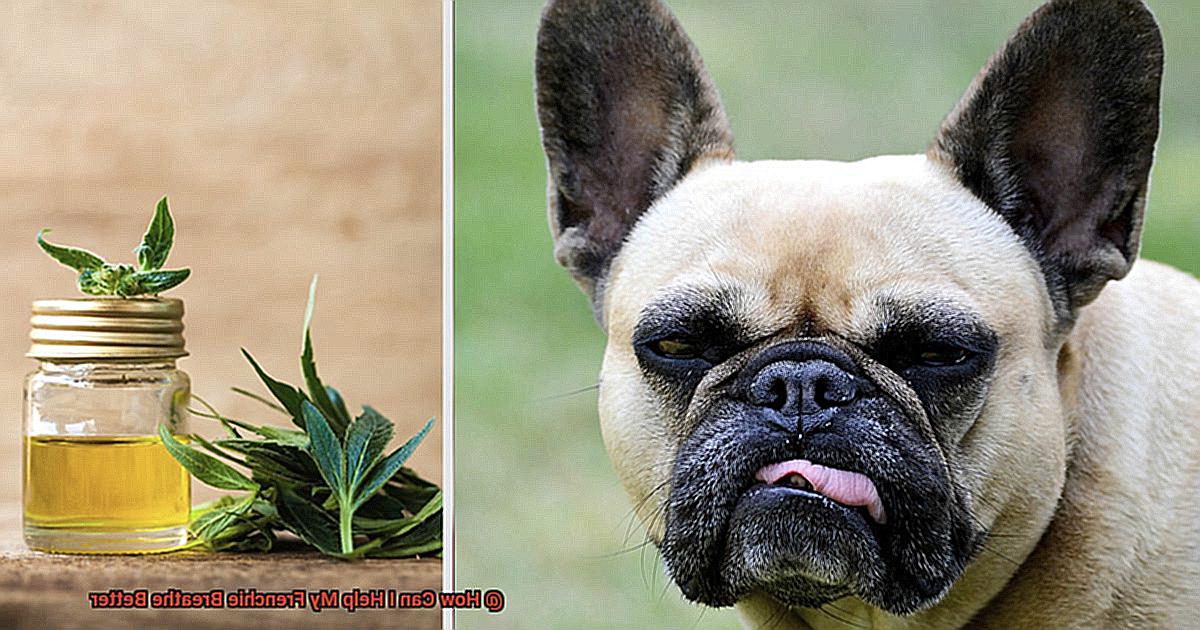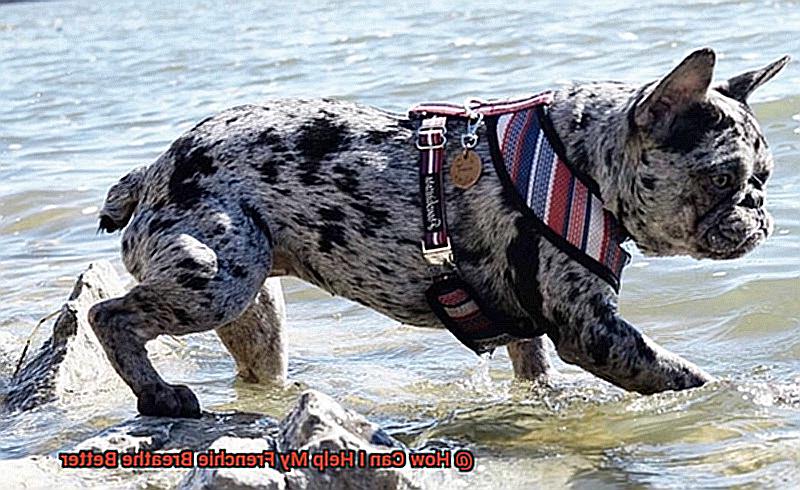How Can I Help My Frenchie Breathe Better?
As proud owners of these lovable and lively pups, we know how important it is to keep them healthy and happy. And one crucial aspect of their well-being is their breathing.
Unfortunately, due to their unique physical features, Frenchies are prone to respiratory issues that can impact their quality of life. But don’t worry, because in this post, we’ll be sharing some valuable insights on improving your Frenchie’s breathing.
So, let’s put our paws together and get ready to learn how to help your furry companion breathe easier and live their best life.
How Can I Help My Frenchie Breathe Better?
Contents
- 1 How Can I Help My Frenchie Breathe Better?
- 2 Identifying Common Breathing Problems in French Bulldogs
- 3 Consulting with a Veterinarian for Proper Diagnosis and Treatment
- 4 Lifestyle Changes to Improve Your Frenchie’s Breathing
- 5 Home Remedies to Clear Nasal Congestion and Improve Breathing
- 6 The Importance of Keeping Your Frenchie Cool and at a Healthy Weight
- 7 Tips for Helping Your Frenchie Breathe Better During Hot Weather
- 7.1 Keep them cool and hydrated: The first step in helping your Frenchie breathe better during hot weather is to keep them cool and hydrated. This may seem obvious, but it is crucial to provide access to fresh, cool water at all times. Make sure to refill their water bowl frequently and add ice cubes to keep it cool. Also, create a cool and shaded area for your Frenchie to rest in when they need a break from the heat.
- 7.2 Monitor their breathing: It’s essential to keep an eye on your Frenchie’s breathing during hot weather. If you notice any signs of difficulty breathing such as wheezing, panting excessively, or struggling to catch their breath, seek veterinary attention immediately. These could be signs of heatstroke or other respiratory issues that require medical attention.
- 8 Conclusion
We all know how much we love our furry friends, and it breaks our hearts to see them struggle with breathing difficulties. French bulldogs are known for their adorable snorts and snuffles, but when those noises turn into wheezing and gasping for air, it can be alarming and concerning. As an expert on French bulldogs, I want to share some valuable insights and tips on how to improve your Frenchie’s breathing and keep them healthy and happy.
Understanding the Causes of Breathing Difficulties in French Bulldogs
First things first, it’s essential to understand why Frenchies are more prone to respiratory issues compared to other breeds. French bulldogs have a unique physical appearance with their short snouts and flat faces, which can lead to narrowed nostrils, elongated soft palate, and a narrowed trachea. These abnormalities can make it difficult for them to get enough oxygen, resulting in snorting, wheezing, and difficulty in breathing. Other underlying health conditions such as allergies or infections can also contribute to breathing problems.
Steps to Help Your Frenchie Breathe Better
- Regular Check-ups: The first step towards helping your Frenchie breathe better is early detection. Make sure to schedule regular check-ups with your veterinarian to catch any potential issues before they become severe.
- Manage Weight: French bulldogs are prone to heatstroke due to their short snouts and narrow airways. Therefore, it is crucial to keep them at a healthy weight as excess weight can put extra strain on their already compromised breathing. A balanced diet and regular exercise can help your Frenchie maintain a healthy weight.
- Environmental Factors: Extreme temperatures and polluted environments can worsen your Frenchie’s respiratory problems. Avoid exposing them to these conditions by keeping them indoors during extreme weather or using an air purifier in your home.
- Proper Snout Care: Regularly cleaning your Frenchie’s nose and keeping it moist with a saline solution can help clear any blockages and make it easier for them to breathe.
- Surgery: In severe cases, surgery may be recommended by your veterinarian. Procedures such as widening the nostrils, removing excess tissue from the soft palate, or reconstructing the trachea can improve your Frenchie’s breathing. However, surgery should always be a last resort and only recommended by a professional after exhausting all other options.

Identifying Common Breathing Problems in French Bulldogs
As a proud owner of a French bulldog, you may already know that these adorable and affectionate pups are prone to various health issues. While they may seem like the perfect companion, their unique physical characteristics can make them more susceptible to certain conditions, including breathing problems.
But don’t worry, understanding and recognizing these common breathing problems can benefit your furry friend’s overall health and well-being. As an expert on the subject, let me guide you through the importance of identifying these issues and how you can help your French bulldog breathe easy.
The Flat-Faced Factor: Brachycephalic Airway Syndrome
One of the most common breathing problems in French bulldogs is brachycephalic airway syndrome. This condition is caused by their flat faces and short snouts, which can lead to difficulty breathing, noisy breathing, and overheating. In severe cases, it can even result in respiratory distress and collapse.
To help your Frenchie cope with this condition, it’s crucial to monitor their activity levels and keep them cool during hot weather. Regular check-ups with your veterinarian can also ensure early detection and proper management of this syndrome.
Narrow Nostrils: Stenotic Nares
Another frequent issue in French bulldogs is stenotic nares, which refers to narrow nostrils that can make it challenging for them to breathe through their nose. This condition often leads to snorting or snoring noises while sleeping or exercising.
If left untreated, stenotic nares can cause chronic nasal infections and other health complications. Your veterinarian may recommend surgery to widen the nostrils and improve your Frenchie’s breathing.
The Long and the Short of It: Elongated Soft Palate
French bulldogs are known for their cute smushy faces, but this feature can also contribute to their breathing difficulties. An elongated soft palate, the tissue at the back of their throat, can block the airway and make it hard for them to breathe.
Symptoms of an elongated soft palate include loud breathing, snoring, and gagging or choking while eating. In some cases, surgery may be necessary to shorten the palate and improve your pup’s breathing.
Consulting with a Veterinarian for Proper Diagnosis and Treatment
As a proud owner of a French bulldog, you probably know that these adorable pups are prone to respiratory issues due to their unique physical characteristics. Their flat face and short snout may make them look cute, but it also puts them at risk for breathing difficulties.
To ensure your Frenchie can breathe easy and live a healthy life, consulting with a veterinarian is crucial. As an expert in treating brachycephalic breeds like French bulldogs, I have seen the importance of this practice firsthand. Let’s dive into why consulting with a veterinarian is essential for managing respiratory issues in French bulldogs.
Early Detection and Proper Diagnosis
One of the main reasons for consulting with a veterinarian is to catch any potential health issues early on. As responsible pet owners, we all want our furry friends to live long and healthy lives. By seeking professional advice, you can detect any respiratory problems early and provide timely treatment.
During the consultation, the veterinarian will conduct a thorough physical examination of your Frenchie’s respiratory system. They will listen to their breathing, check for any nasal blockages or discharge, and assess their overall breathing patterns. This can help identify any underlying health issues that may be causing breathing difficulties.
Expertise in Brachycephalic Breeds
French bulldogs are not your average dog breed, and they require specialized care, especially when it comes to respiratory issues. That’s why it’s crucial to consult with a veterinarian who has experience in treating brachycephalic breeds.
These veterinarians have extensive knowledge and expertise in managing the unique health needs of French bulldogs. They understand the specific challenges these pups face and can provide tailored treatment plans for their individual needs.
Proper Treatment Plan
Once a proper diagnosis has been made, the veterinarian will discuss treatment options with you. This may include medication, surgery, or lifestyle changes. They will also educate you on how to manage your Frenchie’s respiratory issues at home.

It’s essential to follow the veterinarian’s advice and treatment plan carefully. They have the expertise to provide the best course of action for your Frenchie’s breathing problems. By following their recommendations, you can help your furry friend breathe better and improve their overall quality of life.
Lifestyle Changes to Improve Your Frenchie’s Breathing
As a proud owner of a French bulldog, you may already be aware of their unique physical characteristics. These lovable pups have a flat and short snout, making them one of the most popular brachycephalic breeds. While they may look cute and endearing, their short snouts can also lead to breathing difficulties, especially in hot and humid weather.
As an expert on improving a French bulldog’s breathing, I have seen firsthand the importance of making simple lifestyle changes to help our furry friends breathe better. In this section, we will explore some of these changes and how they can greatly benefit your Frenchie’s respiratory health.
Avoid Strenuous Activities in Hot Weather
French bulldogs are not built for intense physical activities, especially in hot weather. Their shortened airways make it harder for them to cool down, leading to potential breathing problems. To prevent this, it is essential to avoid strenuous exercise or playtime during hot and humid weather. Instead, opt for shorter walks or indoor playtime where the temperature is controlled.
Maintain a Healthy Weight
Extra weight can put strain on a Frenchie’s respiratory system, making it harder for them to breathe properly. Consulting with your veterinarian is crucial in determining the appropriate weight for your Frenchie and developing a diet and exercise plan to help them maintain it.
Provide a Cool and Well-Ventilated Environment
During hot weather, it is crucial to provide your Frenchie with a cool and well-ventilated environment. This can be achieved by keeping them indoors with air conditioning or providing them with a cool and shady spot outdoors. It is also important to avoid leaving them in a car or other enclosed spaces without proper ventilation.
Keep Them Away from Secondhand Smoke and Other Pollutants
If you have a smoker in the household, it is important to keep them away from your Frenchie. Secondhand smoke can worsen their breathing difficulties and lead to other health issues. It is also essential to keep them away from other environmental pollutants such as strong chemicals or perfumes.
Train Them Not to Pull on Their Leash
As brachycephalic breeds have shorter snouts, they are more prone to collapsing trachea, which can be aggravated by pulling on their leash during walks. Invest in a harness instead of a collar and train your Frenchie to walk calmly by your side.
Home Remedies to Clear Nasal Congestion and Improve Breathing
Nasal congestion is a common issue that can affect Frenchies, making it difficult for them to get the oxygen they need. But before rushing to the vet, there are safe and easy home remedies that can make a big difference in your Frenchie’s respiratory health.
Warm Compress:
One simple home remedy for clearing nasal congestion in Frenchies is using a warm compress. This can help to loosen up any mucus or blockages in the nasal passages. Simply soak a clean cloth in warm water, wring out excess water, and place it over your Frenchie’s nose and forehead for a few minutes. The warmth will help to open up their nasal passages and make it easier for them to breathe.
Saline Solution:
Another effective method is to use a saline solution to clear the nasal passages. This can be made at home by mixing salt and warm water and using a dropper to administer it into the nostrils. The salt helps to break down mucus and flush out any irritants, providing relief for your Frenchie’s congested nose.
Hydration:
Dehydration can cause the mucus in the nose to become thicker, making it harder to clear. Therefore, keeping your Frenchie hydrated is crucial for their respiratory health. Make sure they always have access to clean drinking water, and consider adding wet food or bone broth to their diet to increase their moisture intake.
Steam Therapy:
Steam therapy is another great option for clearing nasal congestion in French Bulldogs. You can create a mini steam room by running a hot shower and sitting with your Frenchie in the bathroom for a few minutes. The warm, humid air will help to loosen up any mucus and make it easier for your Frenchie to breathe.
Essential Oils:
Certain essential oils have properties that can help clear congestion and improve breathing. However, it is important to note that not all essential oils are safe for pets. Eucalyptus and peppermint are two pet-safe options that can be diluted and diffused in the air or applied topically (avoiding the nose area) to help relieve your Frenchie’s nasal congestion.
The Importance of Keeping Your Frenchie Cool and at a Healthy Weight
As a proud French Bulldog owner, you know just how lovable and unique these little pups can be. With their adorable squishy faces and playful personalities, it’s no wonder they have become a popular breed amongst dog lovers. However, it’s important to remember that Frenchies have specific needs when it comes to their health and well-being. One crucial aspect of keeping your Frenchie happy and healthy is by ensuring they stay cool and maintain a healthy weight.
Why Keep Your Frenchie Cool?
French Bulldogs are notorious for their short snouts, which can make breathing a bit more challenging for them. This also means they have a harder time regulating their body temperature, making them more prone to overheating. This can lead to difficulty breathing, heatstroke, and other serious health problems. That’s why it’s crucial to keep your Frenchie cool, especially during hot summer months.
How Can You Keep Your Frenchie Cool?
There are a few simple steps you can take to ensure your Frenchie stays cool and comfortable:
- Provide Plenty of Shade and Water: When your Frenchie is outside, make sure they have access to shade and plenty of water at all times. This will help them regulate their body temperature and prevent them from becoming dehydrated.
- Avoid Extreme Temperatures: Frenchies should not be exercised in extreme temperatures, whether hot or cold. If it’s too hot outside, try taking them for a walk early in the morning or later in the evening when temperatures are cooler.
- Monitor Activity Levels: While Frenchies love to play and run around, it’s important not to overexert them in hot weather. Keep an eye on their activity levels and give them frequent breaks to rest and cool down.
Why Keep Your Frenchie at a Healthy Weight?
In addition to keeping your Frenchie cool, maintaining a healthy weight is crucial for their overall well-being. Frenchies are prone to respiratory issues due to their short snouts, and being overweight can add extra strain on their respiratory system. This can lead to difficulty breathing, fatigue, and other health problems.
Tips for Helping Your Frenchie Breathe Better During Hot Weather
For many of us, summer means soaking up the sun and enjoying outdoor activities with our furry companions. But as the temperature rises, it’s essential to take extra precautions to keep our French bulldogs cool and hydrated.
Due to their unique physical characteristics, French bulldogs are prone to respiratory issues, especially during hot weather.
As a French bulldog owner myself, I understand the importance of helping our furry friends breathe better during these scorching days. So here are some tips that I have gathered from personal experience and trusted sources to keep your Frenchie cool and comfortable this summer.
Keep them cool and hydrated: The first step in helping your Frenchie breathe better during hot weather is to keep them cool and hydrated. This may seem obvious, but it is crucial to provide access to fresh, cool water at all times. Make sure to refill their water bowl frequently and add ice cubes to keep it cool. Also, create a cool and shaded area for your Frenchie to rest in when they need a break from the heat.
Avoid outdoor activities during the hottest parts of the day: As much as your Frenchie may love going on walks or playing fetch, it’s best to avoid these activities during the hottest parts of the day. Instead, opt for early morning or evening walks when the temperature is cooler. If you must take them out during the day, make sure to bring water with you and take frequent breaks in the shade.
- Use cooling vests or mats: Cooling vests or mats can be a lifesaver for French bulldogs during hot weather. These products use cooling gel or technology to help regulate your Frenchie’s body temperature. You can find these at most pet stores or online, and they can be especially helpful if you live in a hot climate.
- Keep them indoors with air conditioning: Just like us, French bulldogs can benefit from staying indoors with air conditioning on hot days. This will help prevent them from overheating and struggling to breathe in the heat. If you don’t have air conditioning, consider using fans or frozen water bottles wrapped in a towel to keep their environment cool.
-
Monitor their breathing: It’s essential to keep an eye on your Frenchie’s breathing during hot weather. If you notice any signs of difficulty breathing such as wheezing, panting excessively, or struggling to catch their breath, seek veterinary attention immediately. These could be signs of heatstroke or other respiratory issues that require medical attention.
- Regular grooming: Regular grooming is essential for helping your Frenchie breathe better during hot weather. Make sure to remove excess hair and keep their face clean to prevent any blockage in their airways. It’s also a good idea to trim the hair around their nostrils to make it easier for them to breathe.
Also Read: How Much Water Does A French Bulldog Need
Conclusion
In conclusion, there are various ways to help your Frenchie breathe better.
From ensuring proper ventilation and avoiding triggers to seeking medical treatment and providing a healthy diet, every step counts in improving their breathing. Remember to always consult with a veterinarian for the best course of action for your furry friend.
So don’t hesitate to take action and give your pup the gift of easier breathing.




